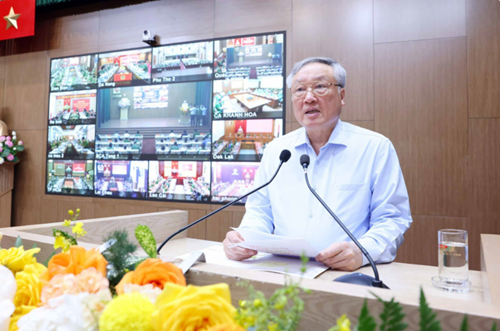Binh, who also serves as Chair of the Amnesty Advisory Council, attended a national conference held by the Ministry of Public Security (MoPS) on July 8 to review the amnesty granted on the occasion of the 50th National Reunification anniversary (April 30) and launch the second round in celebration of the 80th National Day (September 2, 1945-2025).
    |
 |
|
Permanent Deputy Prime Minister Nguyen Hoa Binh speaks at the conference. |
He praised the efforts by ministries, sectors, and localities in successfully implementing the first round of the 2025 amnesty.
Despite the tight timeline, relevant authorities, including members of the advisory council, the MoPS, provincial police, and detention and law enforcement agencies, completed their review processes with precision, caution, and in strict accordance with legal regulations. The selection process was transparent, democratic, and adhered to the clearly defined eligibility criteria.
As a result, 8,055 individuals were granted early release under the State President’s amnesty decision in time to reunite with their families for the April 30 and May 1 national holidays. Public security and social order were well maintained throughout the implementation.
“This achievement reflects not only the dedication of staff at detention facilities and verdict enforcement agencies but also their compassion and sense of responsibility,” Deputy PM Binh stated, adding that their efforts in inmate education, rehabilitation, and management have helped transform lives, enabling many to become law-abiding citizens.
The amnesty embodies the Party and State’s dual approach: strict legal enforcement paired with humane and rehabilitative policies toward remorseful offenders. This also reaffirms Vietnam’s stable political environment and social order. Without this foundation, granting amnesty to such a large number of individuals would not be possible, he emphasized.
Senior Lieutenant General Le Van Tuyen, Deputy Minister of Public Security and permanent member of the Amnesty Advisory Council, noted that 2025 is a milestone year with many major national events. Reflecting Vietnam’s humanitarian tradition and the Party and State's lenient policy toward reformed inmates, President Luong Cuong issued Decision No. 266 on March 3 to grant amnesty to mark the 50th anniversary of the liberation of the South and national reunification.
The decision benefited 8,055 individuals. To date, only four of them have reoffended, representing just 0.05%, Tuyen said.
In continuation, on July 3, the President signed Decision No. 1244 to authorize the second round of amnesty for 2025 on the occasion of the 80th National Day (September 2).
The report on the April 30 amnesty confirmed that the process was conducted in full compliance with the principles of democracy, objectivity, fairness, transparency, and legal integrity. Notably, the inclusion of eligible foreign prisoners in the process also contributed to Vietnam’s diplomatic efforts and was positively received by other nations.
Deputy PM Binh underscored that amnesty is a significant policy of the Party and State, reflecting Vietnam’s humanitarian tradition. It not only upholds the rule of law but also emphasizes the value of rehabilitation and second chances for those who sincerely repent and strive to reintegrate into society.
Given the expanded scope and eligibility criteria for the September 2 amnesty, he noted that there is a considerable workload to complete within less than two months. He urged all ministries, sectors, and localities to draw on lessons from the first round, thoroughly grasp the Party and State's viewpoints and policies, and ensure that the second phase is implemented in strict accordance with the law while maintaining transparency, fairness, and effectiveness.
For the past nearly 80 years, Vietnam has carried out nearly 40 amnesty rounds, with hundreds of thousands of prisoners released and returning to their communities. Since 2009, more than 90,000 prisoners have been granted amnesty.
Source: VNA